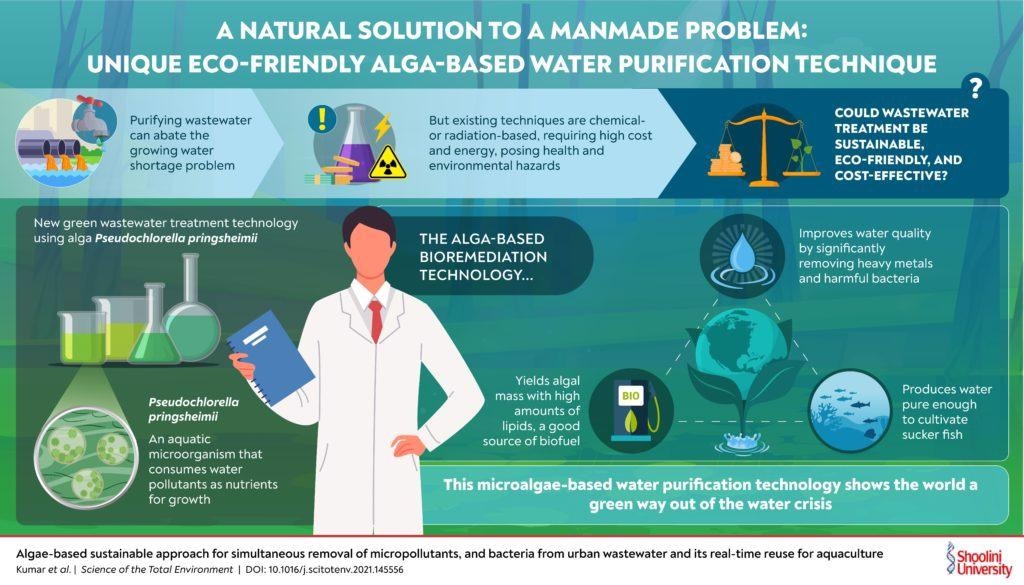Human indiscipline and greed are greatly affecting the availability and quality of freshwater. It has become a global priority to find new approaches to sustainably preserve freshwater supply.
 Using a new strain of algae, scientists have developed an eco-friendly way to purify wastewater. Image Credit: Shoolini University.
Using a new strain of algae, scientists have developed an eco-friendly way to purify wastewater. Image Credit: Shoolini University.
The amazing potential of algae to eliminate large quantities of chemical pollutants and various bacteria from water has made researchers create a new eco-friendly, sustainable and economical solution for urban wastewater treatment. They tested the efficacy of such treated water for pisciculture.
The constantly increasing demand of humans for freshwater has caused its sources to deplete quickly, and researchers have been trying to discover approaches to clean wastewater for reuse to cope with future demands.
Now, the most common wastewater treatment methods require the use of chemicals or UV radiation to destroy microorganisms or eliminate pollutants. Yet, these conventional methods have several disadvantages, such as the lethal effects of chemical substances on human health or the high energy requirements to operate treatment units.
To develop a sustainable system of wastewater treatment, the emphasis has shifted to environmentally friendly and economical technologies. One such technology that is being explored involves using water microorganisms, such as algae, which are said to be able to break down complex molecules.
A team of researchers led by Dr. Pankaj Kumar Chauhan from Shoolini University, India, has created wastewater treatment technology based on algal bioremediation. Their study is published in Science of the Total Environment.
The researchers were from India (Faculty of Applied Sciences and Biotechnology, Shoolini University; Algae Research and Bioenergy Lab, Uttaranchal University; and Department of Biotechnology, Dolphin (P.G.) Institute of Biomedical and Natural Sciences), Russia (Joint Institute for High Temperatures of the Russian Academy of Sciences and Department of Environmental Monitoring and Forecasting, RUDN University), and Korea (Department of Environmental Engineering, The University of Seoul).
Algae quickly cover aquatic bodies with a green film or cause red tides, using the nitrogen, phosphorous, carbon or heavy metals present in water as nutrition. A high quantity of algae in the water then creates competition for sunlight and nutrients with other microorganisms, thereby causing a decrease in the number of bacteria found in the water.
These are a few of the properties that make algae prospective wastewater purification agents. Furthermore, they are also self-sustaining, eco-friendly and economical as a wastewater treatment agent.
We selected a novel microalgal strain Pseudochlorella pringsheimii because it can tolerate high pollutant load and can grow over a wide range of temperatures. Moreover, under conditions of stress, Pseudochlorella is known to accumulate high amounts of lipids in their cells, opening up the possibility of using this algal biomass for biofuel synthesis.
Dr. Pankaj Kumar Chauhan, Study Lead, Shoolini University
To carry out the experiments, the Pseudochlorella pringsheimii microalgae strain was collected from a natural pond and cultivated by the scientists in artificial tanks of raw urban wastewater, which contained antibiotic-resistant bacteria and numerous heavy metal pollutants.
Following 14 days of cultivation, they measured three parameters in these tanks: the growth and biochemical composition of P. pringsheimii and the water quality. They also measured the prospect of using the water treated with microalgae for fish farming.
The outcomes of this pilot-scale study were very heartening. P. pringsheimii cultivation considerably improved the quality of water by eliminating heavy metals and toxic microorganisms.
After the treatment, we observed that the levels of water pollution indicators such as chemical oxygen demand (COD), alkalinity, and hardness reduced by 83.2%, 66.7%, and 69.6%, respectively.
Dr. Pankaj Kumar Chauhan, Study Lead, Shoolini University
“Moreover, the algal growth naturally nearly eliminated the total bacteria and coliform in the water. We also saw a significant increase in the lipid content in wastewater-grown algal biomass in comparison to the algae grown in the control medium. This means, that this algae can be recycled for biofuel synthesis,” Dr. Chauhan added.
Furthermore, suckerfish did not last in raw wastewater, but in treated wastewater, 84% of them not just survived for more than 10 days but their bodyweight also grew by 47%.
This new technology is, therefore, an outstanding success in green wastewater treatment research and pinpointed the suitability of using treated water for cost-effective fish cultivation. Dr. Chauhan is confident that their microalgae-based bioremediation method will lead the way toward a greener and more ecological future.
Journal Reference:
Kumar, V., et al. (2021) Algae-based sustainable approach for the simultaneous removal of micropollutants, and bacteria from urban wastewater and its real-time reuse for aquaculture. Science of the Total Environment. doi.org/10.1016/j.scitotenv.2021.145556.